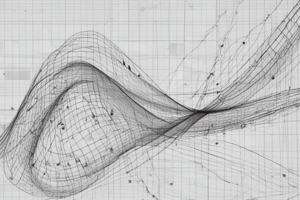Podcast
Questions and Answers
What distinguishes polynomial regression from standard linear regression?
What distinguishes polynomial regression from standard linear regression?
Which of the following is a typical application for polynomial regression?
Which of the following is a typical application for polynomial regression?
In a multiple feature linear regression, how many features are accounted for if n = 4?
In a multiple feature linear regression, how many features are accounted for if n = 4?
What is typically the main goal of feature engineering in polynomial regression?
What is typically the main goal of feature engineering in polynomial regression?
Signup and view all the answers
Which statement about the cost function in polynomial regression is correct?
Which statement about the cost function in polynomial regression is correct?
Signup and view all the answers
When optimizing a polynomial regression model, which method is commonly used?
When optimizing a polynomial regression model, which method is commonly used?
Signup and view all the answers
What does a non-linear relationship imply in the context of polynomial regression?
What does a non-linear relationship imply in the context of polynomial regression?
Signup and view all the answers
Why is polynomial regression particularly advantageous for real-world data?
Why is polynomial regression particularly advantageous for real-world data?
Signup and view all the answers
What is the primary purpose of feature scaling in gradient descent?
What is the primary purpose of feature scaling in gradient descent?
Signup and view all the answers
During gradient descent for multiple variables, how is the parameter vector θ updated?
During gradient descent for multiple variables, how is the parameter vector θ updated?
Signup and view all the answers
In multivariate linear regression, how is the cost function J represented?
In multivariate linear regression, how is the cost function J represented?
Signup and view all the answers
What is the role of the learning rate (α) in the gradient descent algorithm?
What is the role of the learning rate (α) in the gradient descent algorithm?
Signup and view all the answers
What distinguishes the update rule for θ0 in gradient descent from θj where j > 0?
What distinguishes the update rule for θ0 in gradient descent from θj where j > 0?
Signup and view all the answers
In the context of cost function optimization, what does the symbol J(θ) represent?
In the context of cost function optimization, what does the symbol J(θ) represent?
Signup and view all the answers
What is a significant benefit of using multivariate linear regression compared to simple linear regression?
What is a significant benefit of using multivariate linear regression compared to simple linear regression?
Signup and view all the answers
What is the significance of using 1/m in the gradient descent update rule?
What is the significance of using 1/m in the gradient descent update rule?
Signup and view all the answers
What is the impact of using a very small learning rate, α, in gradient descent?
What is the impact of using a very small learning rate, α, in gradient descent?
Signup and view all the answers
In polynomial regression, which of the following is a common reason to create new features?
In polynomial regression, which of the following is a common reason to create new features?
Signup and view all the answers
What does it indicate if the plot of J(θ) versus iterations shows a series of waves?
What does it indicate if the plot of J(θ) versus iterations shows a series of waves?
Signup and view all the answers
Which strategy is recommended for choosing the learning rate, α?
Which strategy is recommended for choosing the learning rate, α?
Signup and view all the answers
What is a key characteristic of polynomial regression compared to linear regression?
What is a key characteristic of polynomial regression compared to linear regression?
Signup and view all the answers
A straight line in a plot of J(θ) versus iterations indicates what about the algorithm?
A straight line in a plot of J(θ) versus iterations indicates what about the algorithm?
Signup and view all the answers
Which of the following statements about automatic convergence tests is true?
Which of the following statements about automatic convergence tests is true?
Signup and view all the answers
How can features affect the outcome of learning algorithms?
How can features affect the outcome of learning algorithms?
Signup and view all the answers
What does it imply if J(θ) increases while plotting against the iterations?
What does it imply if J(θ) increases while plotting against the iterations?
Signup and view all the answers
Which approach can be used to improve the representation of house prices in regression analysis?
Which approach can be used to improve the representation of house prices in regression analysis?
Signup and view all the answers
Study Notes
Polynomial Regression
- Polynomial regression is a form of linear regression
- It models the relationship between variables x and y as an nth-degree polynomial
- This fits a non-linear relationship between x and the conditional mean of y
- Adding higher-order terms of the dependent features is how polynomial regression evolves from linear regression
- Real-world data is often non-linear, resulting in better results using polynomial regression compared to standard linear regression
- Use cases include: tissue growth rate, disease epidemic progression, and carbon isotope distribution in lake sediments
Linear Regression with Multiple Features
- Linear regression with multiple variables extends simple linear regression
- Multiple independent variables are used to predict a single dependent variable
- The goal is to predict the dependent variable based on independent variables
- Multiple Features
- More than one independent variable (e.g. house size, bedrooms, floors, age of home)
- The aim is to predict a dependent variable (e.g. the price of the house)
Gradient Descent for Multiple Variables
- The cost function is J(θ0, θ1, ..., θn) = (1/2m) Σ(hθ(x(i)) - y(i))^2
- Gradient descent is used to find the optimal values for the parameters (θ) to minimize the cost function
- Parameters are updated simultaneously
- θj := θj - α * (∂J(θ)/∂θj)
- α is the learning rate
Gradient Descent in Practice: 1 Feature Scaling
- Feature scaling is important for gradient descent to converge more quickly
- Rescale input features to a similar range (e.g., -1 to +1)
- Methods like mean normalization can be used to center and scale features
Normal Equation
- An alternative to gradient descent for solving linear regression problems (calculating θ values)
- Solves for the optimal value of θ analytically
- Formula: θ = (XTX)-1XTy
- X is the design matrix
- y is the vector of dependent variables
- Can be computationally expensive for very large datasets where calculating (XT X)^-1 becomes very costly
Normal Equation and Non-invertibility
- Non-invertible (singular/degenerate) matrix (XTX) can occur with redundant features
- Redundant features are situations where independent features have a linear relationship
- Solve using a pseudo-inverse in situations where (XTX) is not invertible (Octave/MATLAB)
Overfitting
- Occurs when a model learns the training data too well, memorizing the noise and irrelevant details
- Leads to poor performance on unseen data
- Characterized by high training error and low validation error
- Common causes include high model complexity, noisy data, and insufficient regularization
- Can be detected by comparing the training error and validation error (training error should be lower than validation error).
Underfitting
- Occurs when a model is too simple to capture the underlying patterns in the training data
- Leads to inaccurate predictions on both training and validation data
- Characterized by high training error and high validation error
- Common causes include low model complexity/too few features and excessive regularization
- Can be detected by examining the training and validation errors.
Polynomial Regression (Use Case Example)
- Predicting house prices using frontage and depth (features)
- Creating a new feature: frontage * depth (area) to improve model accuracy (and thus prediction power).
Studying That Suits You
Use AI to generate personalized quizzes and flashcards to suit your learning preferences.
Related Documents
Description
Explore the concepts of polynomial regression and linear regression with multiple features. Understand how polynomial regression helps in modeling non-linear relationships and how linear regression uses multiple independent variables for predictions. This quiz will help you grasp the applications and intricacies of these regression techniques.




